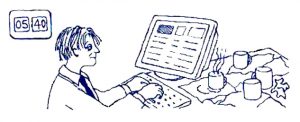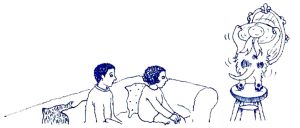Exercise 1
Choose the best captions for the cartoons.
a He’s been working all night.
He’s worked all night.

b I’ve always been knowing the dog was strange.
I’ve always known the dog was strange.

Exercise 2
Choose the best option.
a At last! I’ve solved/been solving the problem.
b Jack has been trying/tried to get his book published for ages but so far no one has said ‘Yes’.
c So, what have you done/been doing recently? Anything interesting?
d My friend has been buying/bought a new car. It looks great.
e I’ve never believed/been believing in ghosts or witches or fairies.
f Fantastic news! They’ve been agreeing/agreed to buy the house!
g You look well. Have you been taking/taken more exercise recently?
h The children are tired because they’ve played/been playing all day.
i Have you swum/been swimming? Your hair looks wet.
j Oh, there you are! I’ve looked/been looking for you everywhere!
Exercise 3
Find the correct sentence in each pair.
a You’re wet! What have you been doing?
b You’re wet! What have you done?
c I’ve never understood maths.
d I’ve never been understanding maths.
e He’s tired because he’s run.
f He’s tired because he’s been running.
g I’ve been walking ten kilometres!
h I’ve walked ten kilometres!
i Sorry I’m late. How long have you waited?
j Sorry I’m late. How long have you been waiting?
Exercise 4
Complete the dialogue. Use the correct form of the verbs in brackets. If two forms are possible, write both.
Sarah: Wow, it a…………………… (be) very busy in the shop this morning, hasn’t it?
Kim: Yes. I b…………………… (put) new stock on the shelves since I got here. There c…………………… (not / be) a quiet period at all. The phone in the office d…………………… (ring) every two minutes, so I e…………………… (answer) that and I f…………………… (try) to answer all the emails that the customer services department g…………………… (send) me!
Sarah: Yes, I know how you feel. It’s incredible! I h…………………… (write) replies to twenty emails. And I i…………………… (serve) all the customers that j…………………… (come) in today.
Answers
Read the note to find out why.
1
a He’s been working all night. -> A
b I’ve always known the dog was strange. -> C
2
a solved -> B
b been trying -> A
c been doing -> A
d bought -> A
e believed -> C
f agreed -> C
g been taking -> A
h been playing -> A
i been swimming -> A
j been looking -> A
3
a c f h j
4
a has been
b ‘ve been putting
c hasn’t been
d has been ringing
e ‘ve been answering
f ‘ve been trying
g have been sending/have sent
h ‘ve written
i ‘ve been serving/’ve served
j have come
Notes
A
Use the present perfect continuous when the activity is important, or is still happening now.
B
Use the present perfect simple when the result of a completed activity is important.
C
Use the present perfect simple (not the present perfect continuous) with verbs that are not usually used in the continuous form, e.g. agree, believe, know, etc.
Review
Present perfect simple or present perfect continuous?
|
Present perfect simple I’ve done all my work! She’s run the London marathon twice. Have they revised for tomorrow’s exam? |
Present perfect continuous I’ve been doing a report on the sales figures. She’s been running – she looks tired! Have they been revising or not? |
It can be difficult to know whether the simple or continuous form is the correct one when you’re using the present perfect. Sometimes there isn’t much difference and it won’t matter which you choose. However, there are two things you can consider when you’re deciding between the two.
– You use the present perfect continuous when the activity that you’re talking about is important, The activity may have finished recently or it may still be going on.
He’s been running for two hours already.
(And he’s still running now.)
They’ve been painting the ceiling.
(That explains why they have paint on their clothes.)
– You use the present perfect simple when you feel that the result of a completed activity is important.
He’s run the marathon.
(This is an important achievement.)
They’ve painted the ceiling.
(The result is important. It looks better now.)
Note: Quite often it doesn’t matter whether you use the simple form or the continuous. The meaning is the same or very similar.
Jim’s worked all night. I’ve had a bad dream.
Jim’s been working all night. I’ve been having a bad dream.
However, use the present perfect simple (not the present perfect continuous) with verbs that are not usually used in the continuous form, e.g. agree, believe, know, etc.
I’ve known Pete for a long time. NOT I’ve been knowing Pete for a long time.
